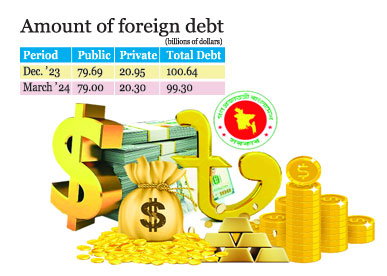Govt in pressure of $1b foreign debt repayment
First 3-months of this year
Zarif Mahmud: The amount of foreign debt of Bangladesh has decreased. In the first three months of this year (January-March), the foreign debt status of Bangladesh has decreased to $99.30 billion. At the end of December last year (year 2023), the foreign debt position was $100.64 billion. In other words, foreign debt decreased by $1.34 billion in three months. Although in the previous quarter (October-December, 2023), foreign debt increased by $4 billion.
The sector stakeholders said that volatility has started in the dollar market since the beginning of 2022, which has not completely subsided yet. The government and Bangladesh Bank have made several plans to increase foreign loans. Among them, the International Monetary Fund (IMF), World Bank and Asian Development Bank (ADB) have agreed to take loans. Besides, Bangladesh Bank is trying to increase foreign loans to the private sector.
However, due to the instability in the dollar market, the private sector is more focused on repaying old loans than taking new loans. Therefore, the short-term debt of the private sector is decreasing rapidly. And due to the high interest rates of foreign loans, entrepreneurs are not taking loans. So foreign new loans are not increasing. In this, the short-term debt repayment is fast and the foreign debt is decreasing overall due to non-availability of new loans.
In the last three months, the external debt of both the public and private sectors has decreased. Analysis of the report shows that at the end of March this year, the amount of foreign debt of the Bangladesh government stood at $79 billion, which was $79.69 billion at the end of last December. According to this, in the last three months, foreign debt in the public sector has decreased by $68.90 billion.
It can be seen that besides the government, the amount of debt of other government agencies has also decreased in the last three months. At the end of March, the government’s direct borrowing amount stood at $67.82 billion, at the end of December it was $67.92 billion. And at the end of March, the foreign debt of other government agencies stood at $11.19 billion, at the end of December it was $11.77 billion.
On the other hand, at the end of March this year, the amount of foreign debt of the private sector stood at $20.30 billion, at the end of December it was $20.95 billion. As a result, foreign debt in the private sector has decreased by $646 million in the last three months.
The report also shows that in the last three months, short-term loans in the private sector have decreased by about $75 million. Among these loans, the amount of commercial loans is $746 million. Most of the commercial loans are buyers credit, amounting to about $5.69 billion. These loans from Buyers Credit are usually on strict terms. Private sector entrepreneurs are at risk of repaying these loans. Besides, foreign back-to-back LCs have a debt of around $955.1 million. And deferred payment debt is $82.43 million.
Meanwhile, in the last three months, medium and long-term loans in the private sector have increased by about $103.6 million. All in all, at the end of last December, medium and long-term debt in the private sector stood at $925.67 million.
Incidentally, Bangladesh’s foreign borrowing has increased significantly in recent years. Debt has increased in both the public and private sectors. Last December, the country’s total external debt crossed $100 billion for the first time. However, Bangladesh is still in a safe position in terms of foreign debt as a proportion of the country’s GDP. According to IMF and World Bank standards
A foreign debt status of up to 40 percent of GDP is safe for any country. Bangladesh’s foreign debt is now less than 21 percent of GDP.
Former Chief Economist of the World Bank Dhaka Office Zahid Hossain said that the foreign debt of the private sector has increased relatively more in the last few years. Moreover, due to the covid-19 pandemic, these loans have been extended for non-payment. Because of that now the pressure has increased to repay the loan. However, the fact that there is no increase in short-term foreign loans to the private sector is positive.
Rare Israeli airstrike in Beirut kills Hezbollah commander and more than a dozen others
International Desk: Israel launched a rare airstrike that killed a senior Hezbollah milita…








